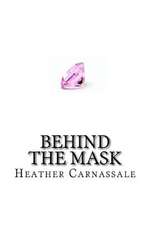Heartbroken
Autor Lisa Ungeren Limba Engleză Paperback – 24 iun 2013
| Toate formatele și edițiile | Preț | Express |
|---|---|---|
| Paperback (2) | 56.00 lei 3-5 săpt. | |
| VINTAGE BOOKS – 24 iun 2013 | 56.00 lei 3-5 săpt. | |
| BROADWAY BOOKS – 8 apr 2013 | 114.19 lei 3-5 săpt. |
Preț: 56.00 lei
Nou
Puncte Express: 84
Preț estimativ în valută:
10.72€ • 11.19$ • 8.87£
10.72€ • 11.19$ • 8.87£
Carte disponibilă
Livrare economică 14-28 martie
Preluare comenzi: 021 569.72.76
Specificații
ISBN-13: 9780345806079
ISBN-10: 0345806077
Pagini: 467
Dimensiuni: 108 x 175 x 34 mm
Greutate: 0.23 kg
Editura: VINTAGE BOOKS
ISBN-10: 0345806077
Pagini: 467
Dimensiuni: 108 x 175 x 34 mm
Greutate: 0.23 kg
Editura: VINTAGE BOOKS
Recenzii
“Stellar. . . . Heartbroken should be on everyone’s summer to-read list. For best results, read it alone on an island on a dark and stormy night.” —USA Today (4 stars)
“Heartbroken has all the makings of a high-wire thriller. But it’s the twisted psyches of its main characters that really unsettle. . . . Unger expertly shows how quiet betrayals can rupture a life as deeply as an act of violence.” —People
“A can’t-put-down thriller interlaced with insightful family drama and echoes of Wuthering Heights.” —Family Circle
“Lisa Unger masterfully writes of the joys and frustrations of family life in her latest novel. . . . What makes [it] shine is the struggle of multidimensional characters with issues that all of us face but sometimes don’t want to acknowledge.” —Associated Press
“Suspenseful. . . . [Unger] keeps the tension high as she delves deep into each woman’s psyche, showing how the smallest decision can have far-reaching consequences.” —South Florida Sun Sentinel
“[An] insidious psychological thriller.” —Chicago Tribune
“A superb stylist. . . . Readers will be haunted for a long time by this profound and heart-pounding thriller.” —Florida Weekly
“Just in time to chill readers to the bone on some steamy summer night." —Tampa Bay Times
“Master storyteller Lisa Unger weaves a compelling plotline.” —Bookreporter
“Unger delivers compelling, fully drawn characters while at the same time putting the thrill in thriller. A first-class page-turner.” —Booklist (starred review)
“Unger skillfully builds the fissures of each of [her characters’] lives as she illustrates the power of the heart and the corrosive nature of lies.” —Publishers Weekly (starred review)
“One of Unger’s best novels yet.” —Library Journal (starred review)
“A triumvirate of strong women pitted against a shared past and dangerous future. . . . Unger knows how to write a taut thriller.” —Kirkus
“Heartbroken has all the makings of a high-wire thriller. But it’s the twisted psyches of its main characters that really unsettle. . . . Unger expertly shows how quiet betrayals can rupture a life as deeply as an act of violence.” —People
“A can’t-put-down thriller interlaced with insightful family drama and echoes of Wuthering Heights.” —Family Circle
“Lisa Unger masterfully writes of the joys and frustrations of family life in her latest novel. . . . What makes [it] shine is the struggle of multidimensional characters with issues that all of us face but sometimes don’t want to acknowledge.” —Associated Press
“Suspenseful. . . . [Unger] keeps the tension high as she delves deep into each woman’s psyche, showing how the smallest decision can have far-reaching consequences.” —South Florida Sun Sentinel
“[An] insidious psychological thriller.” —Chicago Tribune
“A superb stylist. . . . Readers will be haunted for a long time by this profound and heart-pounding thriller.” —Florida Weekly
“Just in time to chill readers to the bone on some steamy summer night." —Tampa Bay Times
“Master storyteller Lisa Unger weaves a compelling plotline.” —Bookreporter
“Unger delivers compelling, fully drawn characters while at the same time putting the thrill in thriller. A first-class page-turner.” —Booklist (starred review)
“Unger skillfully builds the fissures of each of [her characters’] lives as she illustrates the power of the heart and the corrosive nature of lies.” —Publishers Weekly (starred review)
“One of Unger’s best novels yet.” —Library Journal (starred review)
“A triumvirate of strong women pitted against a shared past and dangerous future. . . . Unger knows how to write a taut thriller.” —Kirkus
Notă biografică
Lisa Unger is an award-winning New York Times and international bestselling author. Her novels have sold over one million copies in the United States and have been translated into twenty-six different languages.
Extras
chapter one The Blue Hen was bustling, and Emily had screwed up in at least three different ways since her shift began. She’d given one customer the wrong change. She’d given another the wrong order. And now, as some little kid ran out of the bathroom without looking, cutting her off as she moved down the narrow hallway from the kitchen to the dining area, she felt the tray of ice waters slipping from her hands. She’d stopped short to avoid a collision, but the glasses and the tray had not.
She watched the boy dart down the hallway, but everything else was in torturous slow motion. Four glass tumblers sailed though the air, water pluming, ice cubes suspended. The word “no” pulled and elongated in her mind. And then—the shattering crash. She backed away from the shimmering, slicing mess and stared at it. Oh, God. Oh, no. Why did some days start out bad and just get worse?
Angelo from the kitchen rushed out to help. He had a mop in one hand and a bucket in the other like some kind of diner rescue worker. Then Carol, the owner of the Blue Hen, came around the corner. “What happened?” she asked.
“I dropped it,” said Emily. Obviously. She wasn’t going to bother getting into it about the kid. And how the bathroom door shouldn’t open outward into the hallway. Or how people needed to heed the sign that read: Please open the door and exit slowly. Carol looked at the mess and put a plump, beautifully manicured hand to her forehead. Emily couldn’t help but look at her rings—a big diamond engagement ring and a ruby “family” ring, as Carol had called it. They glittered like stars.
“Let Angelo get it. The order for your four-top is up. You fetch that, and I’ll get more ice water,” Carol said. Her tone was weary but not unkind. Carol was never that. “Try to pull yourself together, Emily. I don’t know what you have on your mind today. But it is definitely not your work.”
Emily nodded. “I’m sorry.”
Carol looked at Emily over the rim of her glasses. She had a nice face, round and pink-cheeked, with pretty, darkly lashed blue eyes. Her body was short and soft—a mother’s body. Carol was, in fact, a bit henlike, Emily thought, zaftig and proud, strutting about clucking. Emily wanted to put her head in Carol’s lap and cry her a river.
“So, what is it, hon?” said Carol. “You need to talk?”
“No,” said Emily. She tried for a smile. “I’m fine.”
Angelo was already on his knees, picking up big shards of glass with calloused hands.
“I’m sorry, Angelo,” said Emily.
He looked up at her with his dark puppy-dog eyes, big, devoted, and a little lovesick. “Don’t worry about it,” he said.
Angelo had a crush on Emily; she knew that. He gave her a wide grin, as though he liked being down on his knees for her. She felt a hot blush spread across her cheeks, and then she was chasing after Carol, who was talking to her. Carol had a fast, soft, but no-nonsense way of communicating. She didn’t care if you participated, only that you appeared to be listening.
“When you get orders wrong, especially for someone like Barney, who comes here every single day at the same time for the same meal, it makes people feel like we don’t know them, don’t care about them. And if you work at T.G.I. Friday’s or Chili’s, maybe that doesn’t matter so much. But here, at my restaurant, it matters—because it’s precisely that kind of personal interaction that separates the chains from the independents. Also, when you give people the wrong change, it makes us seem either untrustworthy or incompetent. Do you understand that, Emily?” Emily knew this wasn’t an invitation to chime in. Carol went on.
“Now, dropping things? Well, it happens. But it usually happens when we’re not present. You’re all flustered from a morning of mistakes. So I want you to take a few minutes, after you bring the food to your four-top, and go out back and take a break. I’ll cover your tables. Then come on back in like it’s a brand-new day, okay?”
Emily found herself nodding vigorously, then running the four-top order over to the family by the window. Pancakes for the girl, French toast for the boy, an egg-white scramble with broccoli for the mom, and a chili-cheese omelet with home fries and an extra side of bacon for the dad (boy, did he ever get a look from Mom over the menu when he ordered that). He looked like he could afford to take off a few, but not in an unhealthy, worrisome way. He was just a beefy guy who liked to eat. He probably had high cholesterol; that’s why his wife had that kind of angry-worried look on her face when Emily placed the plate in front of him.
“Wow,” the mom said. “That looks good.” But what she meant was: Oh, honey, are you really going to eat that? At least that’s what Emily thought. She was good at that, reading faces, body language. She felt like, a lot of the time, she knew what people were thinking even when they were saying something else altogether. She’d always been that way.
After she ran a bottle of ketchup over to the table, she went out back like Carol had asked her to. She sat on the bench where everyone went for a smoke break, and looked up into the sky. The day was warm and humid, clouds high and white. A light breeze made the leaves of the tall oaks that towered above the parking-lot fence dance and hiss. She took a deep breath, trying to shake it off, like Carol wanted.
Why do you want to go to that place and run around for that stu- pid cow?
That’s what Dean had said to her this morning. He hadn’t wanted her to go to work. He’d wanted her to stay with him. He didn’t like Carol. Dean didn’t seem to like anyone Emily liked. She wasn’t sure what that said about him.
“You’ll make more in a morning with me than you will in a week at the Fat Hen.”
“The Blue Hen.”
“Whatever,” he said. He’d lit a cigarette even though he knew the smell made her sick in the morning. “You don’t need to run around like that.”
He didn’t like the idea of her waitressing. His mother was a waitress, and Dean didn’t like Emily to do anything that reminded him of his mother.
“It’s low-class work,” he said.
Emily didn’t think any honest work was “low-class,” whatever that meant coming from Dean. Carol treated her with respect. The customers, maybe because the Blue Hen was not the cheapest restaurant in town, were mostly polite. They tipped well. And usually, Emily was not half bad at the whole waitress thing. She liked talking to people, being friendly, and chitchatting about this and that with the regulars. Carol always made sure Emily had a meal before or after her shift and told everyone to help themselves to coffee and hot chocolate. The Blue Hen was the nicest place Emily had ever worked.
Dean was mad at her when she left. That was why she’d shown up to work all shaky and upset. Well, one of the reasons, anyway. She didn’t like it when he was mad, but if she didn’t go to work and bring in a regular paycheck, they didn’t always make it week to week. Then she’d have to borrow from her mother—which she couldn’t do right now. And that was a whole other set of problems.
It was true that Dean could make a lot of money. But he didn’t always, and somehow it seemed to be gone as quickly as it came in. Then, of course, there were the times when Dean disappeared for days. Once for a week. She hadn’t expected him to come back that time. She wasn’t as happy as she thought she’d be when he finally did come home.
“Feeling better?”
Angelo had come to stand beside her. She looked up at him, and he smiled shyly, turned his eyes toward the sky. He was always sweet to her, and she felt an odd desire to slip her hand into his. He smelled like the lemon soap he used to clean the dishes.
“Thanks for cleaning up my mess,” she said. She folded her hands in her lap.
“No problem.”
She sensed that he was about to say more but changed his mind. He’d asked her out a couple of times. She told him she was living with someone. He’d given up asking, but he still smiled at her a lot, hopeful. She’d expected him to get angry or mean when she turned him down, but he didn’t. He was just as kind to her as he always had been. For some reason, that made her think that he had a nice mom, someone who had taught him to respect women. She really liked that about Angelo.
“I think Carol’s going to need you back inside,” he said. “She has paperwork to do in the office.”
“Okay,” Emily said.
Carol kept the week’s cash receipts in a safe behind the desk in her office. She did all the paperwork during the day on Friday. On Friday night after closing, she took the money to the bank’s after-hours deposit slot. Emily had heard Carol’s husband, Paul, complain about that. He thought they should take it every night on the way home, so there wasn’t as much cash lying around. Carol had agreed. But as far as Emily could see, she hadn’t started doing that.
Emily had noticed that Carol was a creature of habit, and everything had to be done the same way every day. She didn’t like change. From setup to close-up, everything—making the coffee, squeezing the orange juice, refilling the salt, pepper, and sugar dispensers, wiping down the counter and tables—was part of an exact ritual.
Emily liked that about Carol. She was predictable, reliable. There was no mystery to what she wanted, how she would react. It was such a comfort, because Emily seldom had any idea what was going to set Dean off. Or her mother. Emily never knew whether to expect kindness or cruelty from either of them. At the Blue Hen, there was only one rule. Work hard and be nice, and everything would go just fine. That should be the rule for life, too, Emily thought. But, of course, that wasn’t how things went.
Once she was back inside the restaurant, it did feel like a new day. Emily let the rhythm of the place take her, and she was in the groove for the rest of her shift. No more mistakes. At the end of the day, Carol made her a meat-loaf plate with mashed potatoes and gravy and a big helping of sautéed vegetables. Emily wouldn’t have said she was hungry, but she finished every last bite and felt like she could have eaten more. She saw Carol looking at her, and then the other woman came to sit across from her in the booth.
The Blue Hen was in the lull between breakfast and lunch, a few customers lingering over their meals—a mom spoon-feeding oatmeal to a little boy, an old man reading a paper, a couple holding hands at the two-top by the window.
“How was it?” asked Carol. She tapped on Emily’s empty plate.
Emily would have lifted it and licked the gravy clean if she’d been alone.
“Horrible,” she said. “I’m sending it back.”
Carol smiled at her and patted her hand. “You didn’t have breakfast.”
She watched the boy dart down the hallway, but everything else was in torturous slow motion. Four glass tumblers sailed though the air, water pluming, ice cubes suspended. The word “no” pulled and elongated in her mind. And then—the shattering crash. She backed away from the shimmering, slicing mess and stared at it. Oh, God. Oh, no. Why did some days start out bad and just get worse?
Angelo from the kitchen rushed out to help. He had a mop in one hand and a bucket in the other like some kind of diner rescue worker. Then Carol, the owner of the Blue Hen, came around the corner. “What happened?” she asked.
“I dropped it,” said Emily. Obviously. She wasn’t going to bother getting into it about the kid. And how the bathroom door shouldn’t open outward into the hallway. Or how people needed to heed the sign that read: Please open the door and exit slowly. Carol looked at the mess and put a plump, beautifully manicured hand to her forehead. Emily couldn’t help but look at her rings—a big diamond engagement ring and a ruby “family” ring, as Carol had called it. They glittered like stars.
“Let Angelo get it. The order for your four-top is up. You fetch that, and I’ll get more ice water,” Carol said. Her tone was weary but not unkind. Carol was never that. “Try to pull yourself together, Emily. I don’t know what you have on your mind today. But it is definitely not your work.”
Emily nodded. “I’m sorry.”
Carol looked at Emily over the rim of her glasses. She had a nice face, round and pink-cheeked, with pretty, darkly lashed blue eyes. Her body was short and soft—a mother’s body. Carol was, in fact, a bit henlike, Emily thought, zaftig and proud, strutting about clucking. Emily wanted to put her head in Carol’s lap and cry her a river.
“So, what is it, hon?” said Carol. “You need to talk?”
“No,” said Emily. She tried for a smile. “I’m fine.”
Angelo was already on his knees, picking up big shards of glass with calloused hands.
“I’m sorry, Angelo,” said Emily.
He looked up at her with his dark puppy-dog eyes, big, devoted, and a little lovesick. “Don’t worry about it,” he said.
Angelo had a crush on Emily; she knew that. He gave her a wide grin, as though he liked being down on his knees for her. She felt a hot blush spread across her cheeks, and then she was chasing after Carol, who was talking to her. Carol had a fast, soft, but no-nonsense way of communicating. She didn’t care if you participated, only that you appeared to be listening.
“When you get orders wrong, especially for someone like Barney, who comes here every single day at the same time for the same meal, it makes people feel like we don’t know them, don’t care about them. And if you work at T.G.I. Friday’s or Chili’s, maybe that doesn’t matter so much. But here, at my restaurant, it matters—because it’s precisely that kind of personal interaction that separates the chains from the independents. Also, when you give people the wrong change, it makes us seem either untrustworthy or incompetent. Do you understand that, Emily?” Emily knew this wasn’t an invitation to chime in. Carol went on.
“Now, dropping things? Well, it happens. But it usually happens when we’re not present. You’re all flustered from a morning of mistakes. So I want you to take a few minutes, after you bring the food to your four-top, and go out back and take a break. I’ll cover your tables. Then come on back in like it’s a brand-new day, okay?”
Emily found herself nodding vigorously, then running the four-top order over to the family by the window. Pancakes for the girl, French toast for the boy, an egg-white scramble with broccoli for the mom, and a chili-cheese omelet with home fries and an extra side of bacon for the dad (boy, did he ever get a look from Mom over the menu when he ordered that). He looked like he could afford to take off a few, but not in an unhealthy, worrisome way. He was just a beefy guy who liked to eat. He probably had high cholesterol; that’s why his wife had that kind of angry-worried look on her face when Emily placed the plate in front of him.
“Wow,” the mom said. “That looks good.” But what she meant was: Oh, honey, are you really going to eat that? At least that’s what Emily thought. She was good at that, reading faces, body language. She felt like, a lot of the time, she knew what people were thinking even when they were saying something else altogether. She’d always been that way.
After she ran a bottle of ketchup over to the table, she went out back like Carol had asked her to. She sat on the bench where everyone went for a smoke break, and looked up into the sky. The day was warm and humid, clouds high and white. A light breeze made the leaves of the tall oaks that towered above the parking-lot fence dance and hiss. She took a deep breath, trying to shake it off, like Carol wanted.
Why do you want to go to that place and run around for that stu- pid cow?
That’s what Dean had said to her this morning. He hadn’t wanted her to go to work. He’d wanted her to stay with him. He didn’t like Carol. Dean didn’t seem to like anyone Emily liked. She wasn’t sure what that said about him.
“You’ll make more in a morning with me than you will in a week at the Fat Hen.”
“The Blue Hen.”
“Whatever,” he said. He’d lit a cigarette even though he knew the smell made her sick in the morning. “You don’t need to run around like that.”
He didn’t like the idea of her waitressing. His mother was a waitress, and Dean didn’t like Emily to do anything that reminded him of his mother.
“It’s low-class work,” he said.
Emily didn’t think any honest work was “low-class,” whatever that meant coming from Dean. Carol treated her with respect. The customers, maybe because the Blue Hen was not the cheapest restaurant in town, were mostly polite. They tipped well. And usually, Emily was not half bad at the whole waitress thing. She liked talking to people, being friendly, and chitchatting about this and that with the regulars. Carol always made sure Emily had a meal before or after her shift and told everyone to help themselves to coffee and hot chocolate. The Blue Hen was the nicest place Emily had ever worked.
Dean was mad at her when she left. That was why she’d shown up to work all shaky and upset. Well, one of the reasons, anyway. She didn’t like it when he was mad, but if she didn’t go to work and bring in a regular paycheck, they didn’t always make it week to week. Then she’d have to borrow from her mother—which she couldn’t do right now. And that was a whole other set of problems.
It was true that Dean could make a lot of money. But he didn’t always, and somehow it seemed to be gone as quickly as it came in. Then, of course, there were the times when Dean disappeared for days. Once for a week. She hadn’t expected him to come back that time. She wasn’t as happy as she thought she’d be when he finally did come home.
“Feeling better?”
Angelo had come to stand beside her. She looked up at him, and he smiled shyly, turned his eyes toward the sky. He was always sweet to her, and she felt an odd desire to slip her hand into his. He smelled like the lemon soap he used to clean the dishes.
“Thanks for cleaning up my mess,” she said. She folded her hands in her lap.
“No problem.”
She sensed that he was about to say more but changed his mind. He’d asked her out a couple of times. She told him she was living with someone. He’d given up asking, but he still smiled at her a lot, hopeful. She’d expected him to get angry or mean when she turned him down, but he didn’t. He was just as kind to her as he always had been. For some reason, that made her think that he had a nice mom, someone who had taught him to respect women. She really liked that about Angelo.
“I think Carol’s going to need you back inside,” he said. “She has paperwork to do in the office.”
“Okay,” Emily said.
Carol kept the week’s cash receipts in a safe behind the desk in her office. She did all the paperwork during the day on Friday. On Friday night after closing, she took the money to the bank’s after-hours deposit slot. Emily had heard Carol’s husband, Paul, complain about that. He thought they should take it every night on the way home, so there wasn’t as much cash lying around. Carol had agreed. But as far as Emily could see, she hadn’t started doing that.
Emily had noticed that Carol was a creature of habit, and everything had to be done the same way every day. She didn’t like change. From setup to close-up, everything—making the coffee, squeezing the orange juice, refilling the salt, pepper, and sugar dispensers, wiping down the counter and tables—was part of an exact ritual.
Emily liked that about Carol. She was predictable, reliable. There was no mystery to what she wanted, how she would react. It was such a comfort, because Emily seldom had any idea what was going to set Dean off. Or her mother. Emily never knew whether to expect kindness or cruelty from either of them. At the Blue Hen, there was only one rule. Work hard and be nice, and everything would go just fine. That should be the rule for life, too, Emily thought. But, of course, that wasn’t how things went.
Once she was back inside the restaurant, it did feel like a new day. Emily let the rhythm of the place take her, and she was in the groove for the rest of her shift. No more mistakes. At the end of the day, Carol made her a meat-loaf plate with mashed potatoes and gravy and a big helping of sautéed vegetables. Emily wouldn’t have said she was hungry, but she finished every last bite and felt like she could have eaten more. She saw Carol looking at her, and then the other woman came to sit across from her in the booth.
The Blue Hen was in the lull between breakfast and lunch, a few customers lingering over their meals—a mom spoon-feeding oatmeal to a little boy, an old man reading a paper, a couple holding hands at the two-top by the window.
“How was it?” asked Carol. She tapped on Emily’s empty plate.
Emily would have lifted it and licked the gravy clean if she’d been alone.
“Horrible,” she said. “I’m sending it back.”
Carol smiled at her and patted her hand. “You didn’t have breakfast.”










